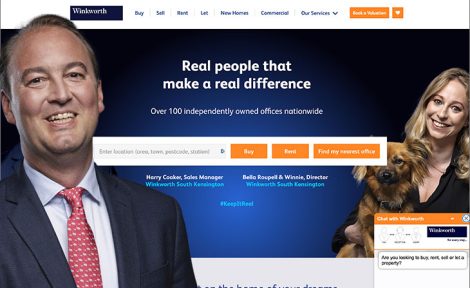Business on the line
Traditional or online? Which agents will win the battle? The lines are blurring, says Andrea Kirkby and it’s service that is key in this changing, challenging market.

Although individual online agents come and go, the online sector is still growing. According to TwentyCi, which researches the space, online agents represent nearly 8 per cent of all exchanges in the second quarter of this year, an increase of 13 per cent from Q1 – and their share of property listings is growing by 30 per cent. Many online and hybrid agents are achieving high growth rates. Yopa, for instance, has listed more properties in the first half of 2018 than it did in the whole of 2017; emoov is listing over 1000 properties a month and has revenues of over £7.5m a year; and Ewemove is trading at a profit according to the Property Franchise Group’s latest trading update.
But the sector is becoming more mixed, too. Many agents have given up the ‘pure’ online model and added elements of a more traditional service. While Purplebricks remains firmly wedded to the pure online model, Yopa, Emoov and EweMove would all characterise themselves as ‘hybrid’.
If I was running a traditional high street business I would probably centralise my sales progression to cut the costs per customer. Russell Quirk, eMoov.

Russell Quirk of Emoov says, “The lines are blurring. If you look at other e-commerce fields, the whole process has been digitised. But this is a different transaction process – complete digitisation is a bridge too far.” Emoov’s extensive market research, he says, showed that “the consumer does not want us to abdicate responsibility through technology”, and led to Emoov adopting an approach he describes as “tech enabled but people first”.
PRICING
The online model can certainly cut costs, and many online agents have led with flat fee and low commission offers. Ben Poynter, CEO of Yopa, says, “traditional agents’ commissions have certainly come under pressure,” and cites figures from Which? magazine showing that the average fee charged across the agency sector has fallen from 2.2 per cent in 2011 to 1.3 per cent today. However, he says, “Some traditional estate agents experiment with changing their pricing models but with very little success, because they struggle with the burden of high operating costs at high street locations.”
Some traditional estate agents experiment with changing their pricing models, but with little success because of the high operating costs.
On the other hand, Russell Quirk believes fees that are set too low can reduce the credibility of online players – and thinks the lower level of fees is likely to rise. “We’ve been pushing fees up,” he says cheerfully; “I’m looking forward to our pricing point getting to above £1,000.” Ewemove, too, is keen not to charge too little. “We can go with a higher fee and we don’t charge a penny upfront,” says Nick Neill, ‘Head Shepherd’ (MD).
James Campbell, Franchising Manager at Winkworth, says each franchise decides on its own fee structure; one of the freedoms franchisees get within the Winkworth framework. But he adds that the training academy includes a whole class just on fees, and new franchisees are happy with the level of commission they achieve.
COSTS & PROFITS
 What’s worth remembering is that online and hybrid agents can make much more profit on the same level of fees as a traditional agent, since their costs are lower. Russell Quirk characterises Emoov’s sales progression process as “very, very old school”, but says that since it’s centralised, it’s low cost. He reckons his costs per customer are ten times less than Countrywide’s and says, “if I was running a traditional High Street business on I would probably centralise my sales progression, to cut costs per customer,” even if he kept the rest of the operation in the traditional format.
What’s worth remembering is that online and hybrid agents can make much more profit on the same level of fees as a traditional agent, since their costs are lower. Russell Quirk characterises Emoov’s sales progression process as “very, very old school”, but says that since it’s centralised, it’s low cost. He reckons his costs per customer are ten times less than Countrywide’s and says, “if I was running a traditional High Street business on I would probably centralise my sales progression, to cut costs per customer,” even if he kept the rest of the operation in the traditional format.
High Street agents often point at poor service from online agents as a reason for consumers to ignore lower prices. But they may be missing a trick if they only look at ‘pure’ online businesses like Purplebricks, which, admittedly get mixed reviews. Many hybrid agents have done extensive research to pinpoint how they can improve their services. Ben Poynter says, “We have invested in better service through our proprietary technology to give customers complete transparency and control over their property sale, and our tech helps to sell homes quicker by streamlining sales progression.” He points out that Yopa has another advantage in its massive buyer database – a single database makes matching buyers to properties both easier and quicker.
Consumers certainly value some aspect of online agency. Russell Quirk says, “The customer actually wants you to centralise and digitise some aspects of the process” – being able to change the price, check feedback, or arrange viewing slots online. “A viewing can take up to six phone calls, otherwise, and that’s supremely inefficient” both for the agent and for the customer, he says.
INNOVATION
Some traditional agents are also adopting innovative approaches. While Winkworth remains resolutely wedded to the high street, James Campbell says, “We do learn from online agencies when it comes to their technological advances.” He says having done their market research, Winkworth decided to develop a seller portal; “we think we’ve pinpointed what works, and it’s getting fantastic results from the branches which are piloting it at the moment.” Pilot users report their conversion rates are up by a third, and full network rollout will be coming soon.
As a franchisor, Winkworth has some aspects similar to the hybrids. “At head office we are simply a support hub,” he says, “so we look to really boost our offices on the high street.”
 Ewemove has its own spin on the hybrid model with what Nick Neill describes as “a concierge type service”; the service is always delivered end-to-end by the same individual. “It’s the personal relationship, not the premises or the technology, where the real value comes from.” He believes that more automated models can deliver well with a simple transaction that goes smoothly, “but the real value add is when it all goes wrong!”
Ewemove has its own spin on the hybrid model with what Nick Neill describes as “a concierge type service”; the service is always delivered end-to-end by the same individual. “It’s the personal relationship, not the premises or the technology, where the real value comes from.” He believes that more automated models can deliver well with a simple transaction that goes smoothly, “but the real value add is when it all goes wrong!”
It’s the personal relationship, not the premises where the real value comes from and our service is delivered end-to-end by one individual. Nick Neill, Ewemove.
Ewemove is structured so that one individual knows everything about the vendor, the property, and the visitors – “it’s not about keyholder access, it’s about knowledge,” Nick explains, “so we can work to find the best purchaser”. Technology is focused on making franchisees’ time as productive as possible, “freeing them up to have more interaction with buyers and sellers” instead of removing them from the transaction. He also points out that EweMove gets about half its enquiries outside normal office hours; it’s open 24/7, which most traditional agents still can’t match.
SERVICE & LOCATION
The competition seems to be changing from purely low-cost to a much more service-based approach. That could be good news for high street agents, with less pressure on pricing – but bad news for those who can’t match the service levels of the hybrid agents.
But while hybrid models are emerging, very few hybrid agents see much value in having an office on the high street. Russell Quirk says delivering value to the customer, “is about being more accessible and better performing, it’s not about having a property. Some agents think the justification of their fees comes from their old-style operation. The fact that they choose to have those overheads doesn’t make their service any more valuable – if the ice cream man sells his van and gets a Rolls Royce Phantom, you’re still not going to pay £66 for two 99s!”

And if you believe many accounts, the high street is dying, and many of the businesses which used to pull customers into the high street are dying too, from Maplin and Poundworld to High & Mighty and East. The high street office might not have quite the advertising pull that it used to have.
Nick Neill says, “If you’re on the High Street you have to apply your income to the overheads. We can apply our money to something else.” He knows that there are high street agents who understand the online model – but they’re trapped in long leases. “They simply cannot wait till their lease is up,” he asserts.
Even Winkworth seems to have mixed feelings on the matter. James Campbell believes agents should be looking to use property much more efficiently. “You don’t need to have an enormous High Street office,” he explains. “You can adopt a more boutique style office which gives you lower start up and running costs, as well as a High Street presence so people can see your brand.”
Online and hybrid agents haven’t yet made an impact at the highest end of the market. They have a limited presence where properties over £1m value are concerned – Russell Quirk admits, “above £2m we do nothing” – but they are gaining everywhere else, and that’s not just at the low end. Emoov’s average house price is now above the UK average, with Tepilo’s average prices above £300,000.
WHAT NEXT?
So, what does the future hold? Online will not disappear, as Nick Neill says, “Arguably every agent has been online since the launch of Rightmove,” it’s just the degree to which they move their operations online that differs. Equally, while online/hybrid agents are gaining market share, they’re not doing so spectacularly quickly; most believe it could take a decade to move agency to a predominantly online model. Russell Quick says, “Look at what Amazon has done to Maplins and Toys R Us” to see what could happen to high street agents, and though the sector is admittedly different, he has a point.
But while many online agents have learned from their experience and adopted a hybrid model, fewer high street agents seem to be looking at the online sector to see what ideas they could adopt. As Winkworth’s move to an online vendor portal shows, though, hybridisation can work both ways – to the benefit of customers as well as the agent’s bottom line.





